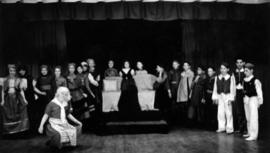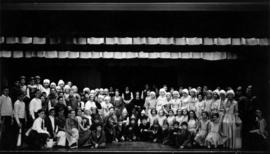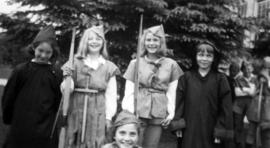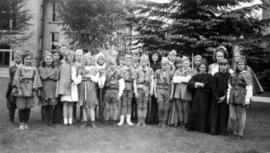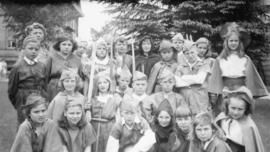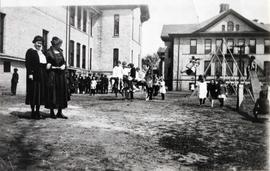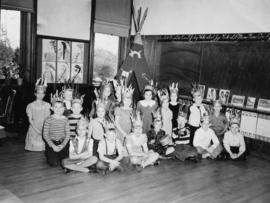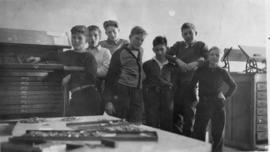Código de referência
Nome e localização da entidade custodiadora
Nível de descrição
Título
Data(s)
- 1886-1983 (Produção)
Dimensão
4.44 linear feet
Nome do produtor
História administrativa
When the Third State Normal School opened in September 1869, a campus laboratory (or model) school opened as well. It contained 70 children. The primary mission of St. Cloud State was to train young men and women to teach in Minnesota public schools. Here students watched St. Cloud State's faculty, as master teachers, teach children typically from kindergarten to eighth grade. The students were often children of St. Cloud State employees who lived nearby.
With the close of World War II in 1945, St. Cloud State began to offer education beyond teacher training. By 1975, St. Cloud State became a university with teacher training as part of its overall curriculum - and that teaching continues today.
In May 1983, the campus laboratory school closed. It was the last Minnesota State University campus laboratory school. Many in the community and on campus objected to the closing.
Âmbito e conteúdo
Spanning from the early years of the university to the later half of the twentieth century, the Campus Laboratory School records range from 1886 to its closure in 1983. The materials in this collection include information on administrative records, student publications, faculty and student material, including lists of class members, and other student creations.
Series 1: Administration
This series deals largely with administrative records that pertain to the Lab School’s budget, purpose and objectives, and reports on the restructure of the school in the 1970s, and its curriculum. The series also includes meeting minutes from faculty meeting minutess, informational booklets about the school itself, and status and annual reports regarding the school’s progress.
Series 2: Publications
This series contains publications written by the students of the Lab School. These publications include the newsletters Riverview Monthly, Booster, Currents, and Challenger. The publication's content was written by students and contains reports of current events, short stories, poems, school news, information about upcoming events, and drawings.
Series 3: Students and Faculty
This series covers the largest span of dates and contains information about the faculty and students. Material here includes lists of students and when they attended the Lab School, lists of faculty and when they taught, grade books, certification of students, and some curriculum material for physical education, art, and music programs. There are are also programs from Lab School events - music, art, and theatre.
Series 4: Oversize
This series is of one oversize box. The series contains drawings drawings of the Lab School buildings on stationary, a scrapbook and letters regarding the closing of the school, and about an exhibit from the school’s final year and day. The exhibit is displayed through a panoramic photo of a wall in which photos were hung depicting faculty and students doing activities throughout the last year of the Lab School in 1983.
Sistema de arranjo
The records are arranged in four series.
Series 1: Administration
Records are in alphabetical order.
Series 2: Publications
Records are organized in chronological order.
Series 3: Students and Faculty
Records are in alphabetical order.
Series 4: Oversize
Records are organized by folder size.
Records are located at 27A.6a-7b.
Condições de acesso
There are no access restrictions.
Acesso físico
Acesso técnico
Condiçoes de reprodução
Permission to publish, quote, and reproduce must be secured from the copyright holder.
Idiomas do material
inglês
Escrita do material
Notas ao idioma e script
Instrumentos de descrição
História custodial
Fonte imediata de aquisição
Informações de avaliação, seleção e eliminação
Incorporações
Existência e localização de originais
Existência e localização de cópias
Material arquivístico relacionado
Descrições relacionadas
Notas especializadas
Identificador(es) alternativo(s)
Regras ou convenções
Fontes utilizadas
Nota do arquivista
Processed by Patricia Rolfes and Kennedy Gratke Lundquist in November 2022.

